













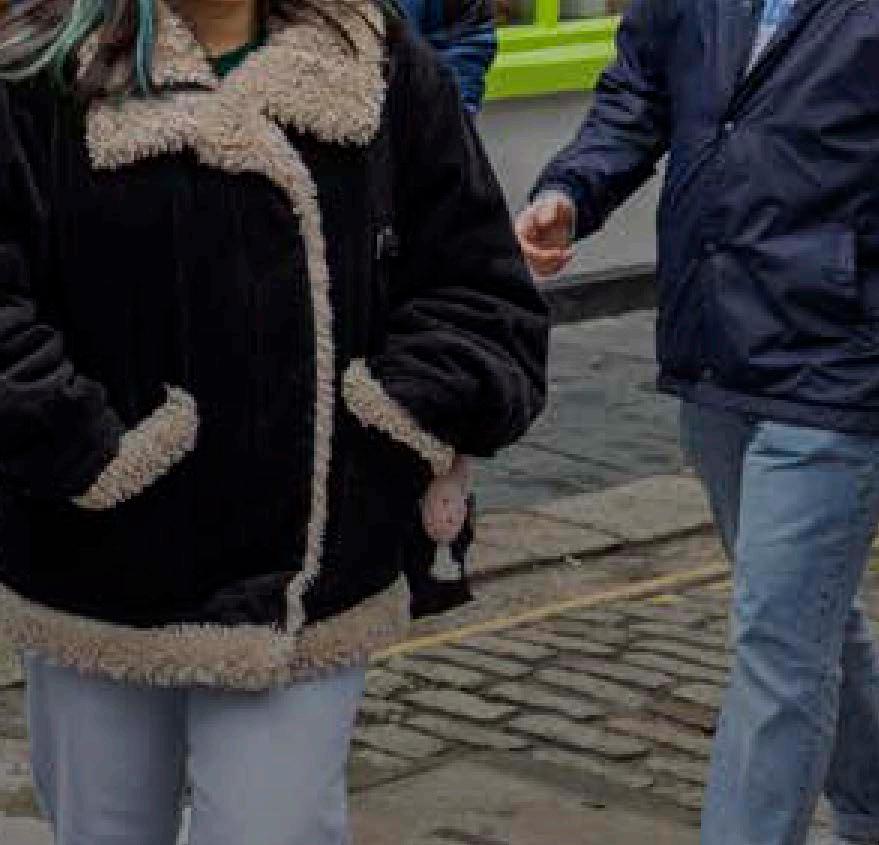



Admissions
+44 (0)1752 585858 applications@plymouth.ac.uk plymouth.ac.uk
University of Plymouth Drake Circus Plymouth Devon PL4 8AA United Kingdom

Follow us on social media @PlymUni



















Admissions
+44 (0)1752 585858 applications@plymouth.ac.uk plymouth.ac.uk
University of Plymouth Drake Circus Plymouth Devon PL4 8AA United Kingdom

Follow us on social media @PlymUni
Welcome to the postgraduate edition of Student Life. In this issue you’ll find content from our alumni and discover where their masters degree has taken them since graduating, as well as fees and funding information, the social side of postgraduate student life, and much more.
We’re so proud of our postgraduate community, and we hope this edition will provide you with the information you need to take that next exciting step towards securing your future.
Meet some of this issue’s contributors:

MA Environmental Humanities
Working part time alongside studying. P.20


Resources and support at Plymouth. P.22
Discover funding support
Let us shed light on and support you with all matters finance to help you on your postgraduate journey. There are many avenues of funding and support you can explore. Scan the QR code below to find out more.
Becoming a healthcare professional. P.14
Get to know your Careers Service
It’s never too early to start thinking about where your postgraduate degree could take you. Our Careers Service offers a huge range of support. Start exploring your opportunities by scanning the QR code below.
HOT TOPIC
P.6 Alumni community
How studying a masters helped shape the future for some of our graduates

FEATURES
P.8 Your finances
Discover all you need to know about funding your future

P.10 Where will your masters take you?
The importance of careers guidance for postgraduate students
P.16 Student Hub
Discover our range of support services available


This is an exciting time to be joining the University of Plymouth. We are one of just a handful of universities in England to be awarded triple gold status in the Teaching Excellence Framework. It recognises the outstanding quality of our student experiences and outcomes, but also our commitment to enabling every member of our diverse student population to succeed. We offer an experience enriched by research, professional work and self-
development opportunities that lay the foundations for your future success.
Following an investment of around £100 million in our campus, we have recently opened outstanding new facilities in engineering, design, nursing and health professions. They are already being used to drive future innovations in fields as diverse as offshore renewable

energy and optometry. Our new Business School is also taking shape fast. But whatever your chosen subject, you can be confident in the knowledge that you will have first class facilities to inspire you.
These developments further our commitments to sustainability. In 2023, we became the second university in the UK to be awarded carbon neutral status. We have big plans to build on that success in the future. Our students are a central part of our sustainability mission, and it is embedded across all our programmes. Our entire academic offer is also directly aligned to the United Nations Sustainable Development Goals.
We have also earned many other accolades in recent years. The University is a three-time winner of the Queen’s Anniversary Prize for Higher and Further Education, most recently in respect of its pioneering research on microplastics pollution in the ocean. Students and staff have also secured a number of prestigious individual successes.

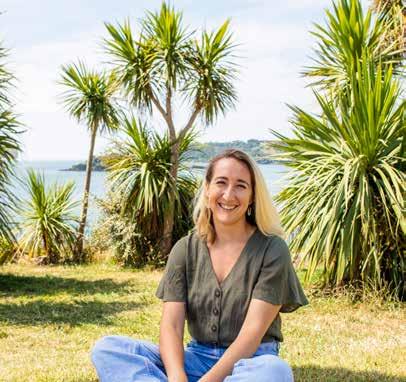
Our commitment to you is to enable you to learn the skills you need to succeed, but also gain the experience of how – and when – to use them. With strong connections to business and industry, we generate opportunities for placements, internships, employment and entrepreneurship. You will also have access to a full range of non-academic and wellbeing support throughout your studies, meaning you get the opportunity to develop professionally but personally as well.
We are a university that prides itself on its mission of Advancing Knowledge and Transforming Lives. As a Plymouth student, all manner of excellence and expertise is at your fingertips, with the added bonus of living in one of the most stunning parts of the country.
We encourage you to live your university life to the full, and grasp every opportunity that comes your way.
Alan Williams Communications Officer
Find out how studying in Britain’s Ocean City has helped shape the future of our postgraduate students.
Sami MSc Robotics

Pursuing my MSc in Robotics was an absolute eye-opener – the programme was accessible despite my non-robotics background, yet rich in both detail and opportunity. I was able to work with and learn from many talented and passionate people, both staff and students. I feel that overall, I graduated as a much more fulfilled and employable engineer than when I enrolled. After my masters the contacts and skills I gained directly helped me secure my first job – working at the University itself! I am extremely thankful to Plymouth for this, as it has proved to be a great start to my career. I have worked in many fields since then that are unrelated to robotics, but wherever I go, I find myself making excellent use of the skills and confidence that Plymouth equipped me with.
Top tip: You are smarter than you think. No matter how complex a problem is, it can be broken down into small and manageable parts that you can navigate. Whether it’s studying a new subject, making a career change, or picking up a new hobby, you’ll always be able to succeed eventually – just be sure to give yourself plenty of time, and don’t be embarrassed to revisit the basics or ask silly-sounding questions. This is how everyone learns, and it’s never inappropriate to learn.
Studying at Plymouth helped me move into an entirely new field from my previous employment. After my undergraduate degree, I didn’t feel like I was done learning and was also struggling to picture what types of careers would interest me. I chose to study illustration because it had always been an interest of mine but not something I thought about pursuing seriously. Getting to learn more about the field with the support of experienced academics and a close student community gave me the tools I needed to build my portfolio. The programme structure involved

a mixture of work experience with real clients that I needed, and the academic theory that I loved. Overall, my time here helped me understand the subject and myself better, and I feel so much more confident about making changes in my career since graduating.
Top tip: It’s hard to pick just one! I’d recommend just saying yes to as many opportunities as possible to make the most of your experience at Plymouth, whether that’s work experience your tutors recommend or grabbing drinks with your coursemates after a lecture. Be confident in your skills, and don’t be afraid to ask for help when you need it.
Melissa MSc Zoo Conservation Biology
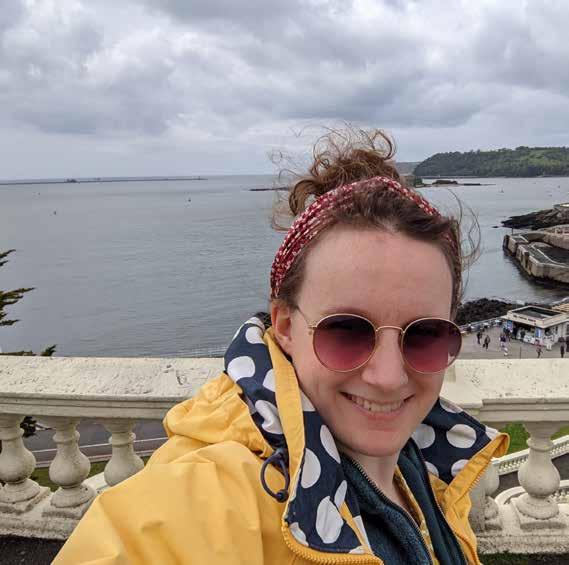
Megan MSc Data Science and Business Analytics
I came to Plymouth for my masters degree, which was in Data Science and Business Analytics. I’m now doing my PhD in Computing, focusing on using AI to try and detect Parkinson’s disease early through brain scans. Between my undergraduate degree and now, I’ve done a lot of different jobs. I did my undergraduate degree in history, but I decided not to pursue that as a career, which is why I chose a conversion programme.
Top tip: My advice to someone considering a career change or course conversion would be, if they can, to absolutely go for it! It’s been so important and positive in my life and I’m so much happier now having had time to think about my career over the past years. I’ve now started a career that I intend to pursue. I finally feel, after ten years of studying and working different jobs, that I’m finally in the place that I’m supposed to be.

I worked during and after my undergraduate studies where I developed many skill sets, both professionally and academically. I was regularly looking for more opportunities to learn as much as possible. Although I was also able to take advantage of many unique opportunities to further explore the industry, including virtual internships in Costa Rica and South Africa. The zoo industry is intricate and complex, and
I still wanted to learn more. This led me to search for a postgraduate programme that could allow me to gain more in-depth experience in the many aspects of the zoo and aquarium industry.
Top tip: It can be difficult to manage limited finances while also trying to get the full experience with new friends and unique opportunities, but I find that saving money on shortterm items is better spent on experiences that create lifelong memories!
GRADUATION IS JUST THE BEGINNING!
There’s a whole host of amazing benefits open to you as a graduate of the University of Plymouth. Make sure you’ve updated your details and enjoy benefits such as invites to networking events, ongoing career and start-up support, and up to 20% off your postgraduate fees.
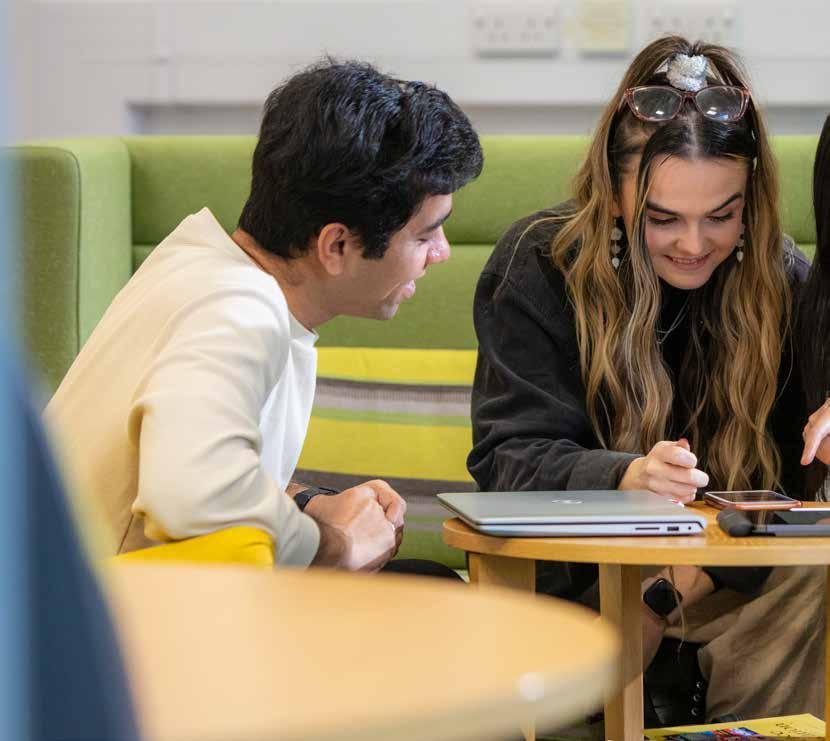
You’ve applied for a masters programme and now it’s time to start thinking about funding it! You could be eligible for a loan from the UK government of up to £12,471 to help with programme fees and living costs.
WHAT YOU NEED TO KNOW
• It’s recommended to apply for student finance early to ensure it’ll be paid in time for the start of the academic year.
• You do not need a confirmed place to apply.
• The loan is not means tested.
• It will be paid directly into your bank account in three instalments during the academic year.
• If you study part time, you can only get payments in the first two years of your programme.
• It can be used however you like – either towards your tuition fees, living costs, or other costs associated with your postgraduate study.
• You’ll start to repay the loan once you’ve finished your programme and are earning over £21,000.
YOUR NEXT STEPS
You apply via the government website (https://gov.uk/masters-loan) with the following essential information:
• Valid UK passport (if you have one)
• Programme provider and programme details
• Bank account information
• National insurance number.
Just like the undergraduate loan application, you don’t need to complete your application all in one go – you can save your progress and go back at any time to complete it.
It’s important to print your student declaration form, sign, and return it. If you’re asked to provide any evidence or
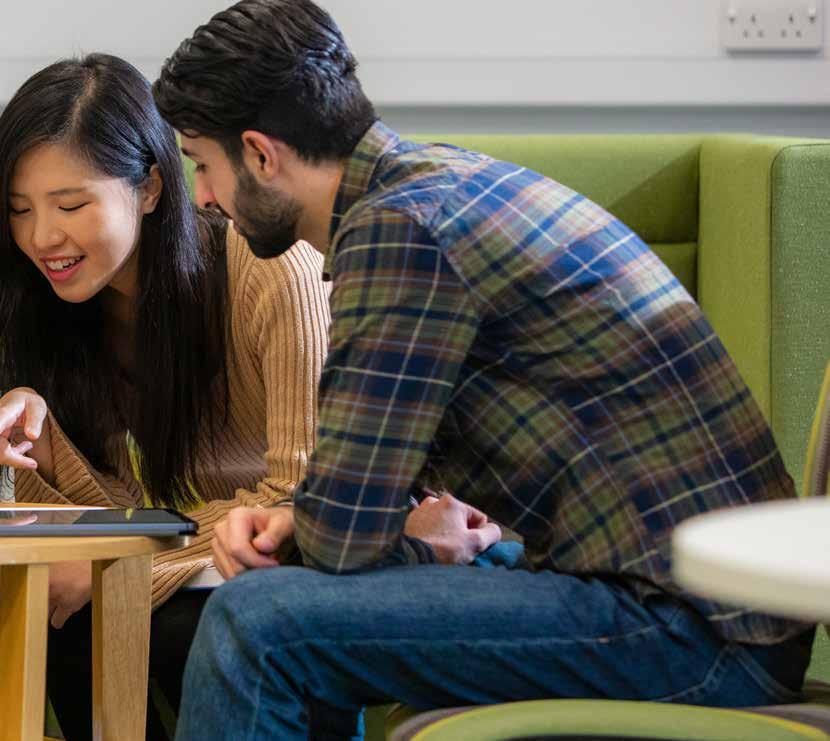
supporting documentation, send it as quickly as possible to avoid delays with your application.
If your personal information, programme or university changes, let Student Finance England know before your programme starts.
Once your application is complete, Student Finance England will assess it and send you an entitlement letter, confirming how much you’ll get. They will also send you a payment schedule to let you know when you’ll be paid. You will have to enrol on your programme before the first payment can be made.



Studying a postgraduate degree offers many opportunities – be it a change in career, progression to roles that require a higher qualification, or enhanced subject knowledge. At Plymouth, we’re here to help you realise your ambitions.
Our Careers Service is here to help you explore different career opportunities, and to help you evaluate and prioritise what your preferred next steps might be. Our services are free and easy to access as both a current student and graduate, for as long as you need. You can access the Careers Service for one-to-one appointments for career guidance, advice on job searches, CVs, LinkedIn, interview preparation and much more. Visit our webpage for further details:
The Careers Service runs a wide range of employer-led careers and recruitment events to enable you to interact with employers. These include careers fairs and employer drop-ins, and insight panels for students wishing to explore placement, graduate and part-time work opportunities. There is also a programme of skills development workshops on interview success, assessment centre advice and tips for job searching.
The University offers a mentoring programme* whereby students are matched with industry professional mentors who give their time and knowledge to support students. Mentors can help students gain unique insights into their desired careers, learn about networking opportunities, increase their skills, and undertake mock interviews, giving them a competitive advantage in the job market.
*The Careers Mentoring Programme is open to all students and recent graduates, excluding those on postgraduate research programmes.

“My experience of the Careers Service was highly positive. The advisers are informative, approachable and incredibly helpful, and I am so grateful the University offers this wonderful service. My only regret is that I haven’t used it as much as I wish I had done!” Charlotte, MA Education
F The Cube is the University’s business creation and growth service, offering a range of activities and support to our students and graduates. The Cube’s enterprise support service provides advice, funding and support to students to enable them to develop enterprise skills. It offers information, training and guidance on starting a business or becoming a self-employed freelancer.

“Even now, when I’m running a business and beginning my career as an educator, I continue to receive outstanding careers and enterprise support from the Careers Service team.”
Eleanor, LLB (Hons) Law graduate

“The University career fairs are a goldmine, especially for connecting with peers and companies in your field. I attended some recently and had a blast learning from companies and uncovering new opportunities. And here’s a shocker – I’m not some super extrovert!”
Mya, MEng (Hons) Mechanical Engineering
WHAT’S ON OFFER?
• Events and workshops from the experts
• One-to-one appointments
• Business competitions and awards
• Free Chambers of Commerce membership
• Workspaces
• Resources and e-learning
• University of Plymouth Freelancers Agency
FIND OUT MORE
Discover The Cube’s services for all students and graduates starting, or hoping to start, their own business.



PRESIDENT OF THE STUDENTS’ UNION
Postgraduate students have exactly the same access to our Students’ Union as undergraduate studentssomething not everyone knows.
“Through close collaboration with the Students’ Union, the Uni ensures that the voices of our diverse student community are amplified, shaping an inclusive environment where academic excellence thrives hand-in-hand with personal growth. Plymouth is truly a place where ambitions soar and lifelong memories are forged.”
CAN YOU DESCRIBE THE ROLE OF POSTGRADUATE REP AND SUPPORT PROVIDED FOR POSTGRADUATE STUDENTS?
I am now the president of the SU, but I was previously the postgraduate rep. As a postgraduate rep, my role involved being a go-between, between students and the University, essentially being a voice to amplify students’ needs or concerns, as someone they can freely relate to. I made sure postgraduate students weren’t overlooked and that their experience was full of joy.
HOW CAN STUDENTS GET INVOLVED WITH THE POSTGRADUATE COMMUNITY?
The most effective way is to attend the postgraduate meet and greet events in person and online. This provides students the opportunity to socialise, interact and get involved with the community, and was the most effective way we’d seen so far to bring people together. Students can also get in contact through social media, Facebook communities and emailing the current PG rep with any concerns or things they want to talk about.
WHAT’S IT LIKE BEING PART OF THE POSTGRADUATE COMMUNITY?
At undergraduate level there is an immediate sense of inclusion and community, whereas at postgraduate
level you’re considered to be at a level where a lot of what you’re doing can be self-taught and you’re expected to be more independent, and figure things out alone. However, the postgraduate community provides that support system and actively reduces any feelings of isolation, made up of like-minded individuals.
The Postgrad Society is open to all current postgraduate students studying at the University.
The society aims to nurture a vibrant community where students can socialise without the pressure of academia, de-stress from the day-today, and celebrate their achievements with other like-minded people.
Navigating student life as a postgraduate student can be a strange experience so the society offers a space for postgraduates to get to know each other away from academia. Our collaborations with other societies mean you can give all sorts of activities a go!
Socials include trips and excursions throughout the year, pub quizzes, movie nights and a Postgraduate Students Christmas Ball. We have previously participated in events such as fundraising and volunteering as well as beach cleans.
postgradsocietyplym@outlook.com
A HUGE event in the University’s calendar, Varsity involves thousands of students from the University of Plymouth and our rivals Plymouth Marjon University. Each year, these two universities battle it out in lots of sports from different University sports clubs: a whopping 23 matches in 2023! It’s one of the biggest events in the
University’s calendar (even if you’re only a spectator cheering on our team!), raising a large amount for charity. Our University was crowned champions of Varsity 2023.
STUDENT ACTION FOR REFUGEES
We have a number of societies designed to help the wider community. One of these is The Student Action for Refugees society, which holds events such as tote bag painting fundraisers to raise money for local refugee charities – a great way for people to have fun while raising money for an important cause. The society is really looking forward to holding more events like this in the future. If you have a passion for helping others, and perhaps even have ideas for a fundraising event, this could be the society for you.
LAW SOCIETY
Looking for a society focused on your programme?
The Law Society is a great example, winning Best Careers Event of the Year with a rather prestigious cheese and wine networking event. Over 200 legal professionals attended from the local area, including barristers, solicitors and police officers. The event enabled lots of our students to build their networking skills, meet professionals and explore different avenues regarding jobs in the legal sector.
WILDLIFE AND ECOLOGY SCOCIETY
This society contributes to local projects and raises awareness around campus. It supports charities and people currently working within the sector through fundraising events and volunteering. Mambers actively take part in experiences such as surveying, data collecting, planting, etc. Workshops and external speakers also give members skills and knowledge on wildlife, foraging and how to make your life more sustainable.
As we move through a career, what we want out of life and our circumstances can evolve and change. Choosing a different postgraduate degree once you’ve already started to establish a career path may seem daunting, but our conversion programmes are designed to help you navigate that change of direction. These programmes are a really great stepping stone, enabling you to set out on a completely new career!
We spoke to Anna about her journey into the MSc Pre-registration Nursing (Adult Health) programme and what she had to take into account to make the step.
WHAT WAS IT THAT ATTRACTED YOU TO STUDYING NURSING?
I was working in London in marketing and business development. When COVID happened, I boomeranged back home to my parents’ house in the Isle of Arran in Scotland. It’s a beautiful island but there’s not a huge choice for employment, so I got jobs in restaurants and eventually a care home. I realised that style of working suited me so much better. I enjoyed constantly interacting with people, coming home after a 12-hour shift feeling like I’d made a difference in people’s lives. I then began to consider the idea of a career in healthcare and found out you can apply to train with your experience. I considered podiatry for a while, but in the end the nursing route seemed more me. As I already had a degree, I could apply for a masters, meaning nothing I had done previously felt like it had gone to waste. I moved down to Plymouth as that’s where my boyfriend was based, and now I’m halfway through the MSc.
WHAT DO YOU ENJOY MOST ABOUT YOUR PROGRAMME?
The MSc is great because it’s a threeyear nursing programme condensed into two years at a slightly higher

academic level. For me, this feels like an efficient use of two years, which can be a daunting commitment once you’re over a certain age. It’s quite full on and extremely different to my undergrad degree, but I’m learning so much. It’s nice to have such a clear-cut path for the first time in my life.
WHAT DO YOU LIKE ABOUT LIVING IN PLYMOUTH AND THE SURROUNDING AREA?
Plymouth itself is perfect for what I’m doing. It’s pretty cheap and near the sea. The fact I can drive to almost anywhere in Cornwall and back in a day is great if you love the beach. I’m not really interested in bars and clubs so much any more, but I’ve heard the nightlife is good.
HOW HAVE ACADEMICS AND SUPPORT STAFF SUPPORTED YOU IN YOUR LEARNING AND DEVELOPMENT?
We’re each assigned a personal tutor you can email and have Zoom calls with. The Skills Lab team is also fantastic, with a special shout-out to Mano, who is very supportive. Occasionally graduates who are now working as nurses come in and help out with the sessions and reassure us that some of the practical things we’re doing won’t always be as scary!
For assignments, there’s also a Writing Café where you can take your assignments to a PhD student to check over and help you word things better.
WHAT FIELD OF NURSING CAN YOU SEE YOURSELF GETTING INTO?
I believe I’d enjoy the faster-paced wards like ICU and A&E, but it’s too early to tell. I’ve got an optional placement coming up in the summer that I’ve organised myself in York. However, a lot of people rave about community nursing, which I start a placement in soon. We’ll see! I’m also keen to work abroad at some point. I’ve always loved travelling and it’ll be nice to have a qualification that will allow me to move about easily, especially with a partner in the military.
WHERE DO YOU SEE YOURSELF IN TEN YEARS?
Maybe one day I’ll be managing a ward as a senior sister, or maybe I’ll go into academia and become a lecturer. It’s also hard to know as the NHS will probably change so much in the next decade. I’m just focusing on today and tomorrow!
FIND OUT
MORE about our MSc Preregistration Nursing (Adult Health) programme:

WHAT WAS THE TRANSITION LIKE FROM BEING OUT OF EDUCATION AND EMPLOYED TO STUDYING AS A MATURE STUDENT?
It’s nice to shake things up a bit from working full time to having a slightly more flexible schedule again. But then placement starts and it feels the same as having a job. Getting back into studying was easier than I thought because I’m so much more focused than I was when I was 18. During my first degree, I barely remember doing any work; I just went out a lot and focused on the extracurricular side of uni. Now all I care about is the MSc and I’m getting so much more time out of it.
HOW IMPORTANT WAS THE £5,000 NHS GRANT TO YOUR DECISION TO UNDERTAKE POSTGRADUATE STUDY?
I don’t think I would have been able to do it without it, so very important!
WHAT ADVICE WOULD YOU GIVE TO SOMEONE CONSIDERING A CAREER CHANGE AND WHO IS ABOUT TO DO A CONVERSION PROGRAMME?
Do try to continue doing part-time work. Not only will it keep you afloat, but it will remind you why you want to do the programme in order to progress. The only other advice is to go for it! The time goes quickly, and if this is your second degree you’ll probably enjoy it much more than the first one.

Heading off to university is a huge step but full of amazing opportunities and experiences which will reach far beyond the classroom. The university experience is a very individual journey, and we want our students to be able to thrive and enjoy their time here. For some students, sometimes life can take an unexpected turn and they may find themselves needing a little extra support. That’s where we can help. The Student Services Hub team are here to offer a friendly listening ear, advice and guidance on any non-academic queries our students may have.
Based in the centre of the campus in the Charles Seale-Hayne Library, the Student Hub is the place to go for students who have any concerns or need any non-academic support during their time at university. Our team of friendly and experienced Hub Advisors are on hand to talk things through and offer a range of options to help support our student community. From disability support to student wellbeing, or financial guidance to visa advice, or even if students don’t know what help they need, they can come and have a chat with us, and we can work through it together.

“I got tremendous help and advice from the Student Hub, student ambassadors, my tutors and other staff. It’s almost unbelievable how willing they are to help you at every moment.”
Ruth, MSc Digital and Social Media Marketing

Students may find that they never need our support and that’s ok, but just know that whether you need us or not, we are there.
We love being part of the student journey and seeing students grow in confidence and determination, eventually saying goodbye when they graduate with their friends, peers, family and/or supporters. It really is an honour!
Heather Shepherd, Student Services Hub Manager

“I contacted the Student Hub a couple of times with questions and everyone I spoke with was so kind and happy to help! I really appreciate how helpful and reassuring the team were to keep things running smoothly.”
Steph, MSc Marine Conservation student
Plymouth offers a wide range of private sector accommodation for postgraduate students to choose from.
Here are our tips for finding the home that’s right for you!
Think about the type of home you want. Do you want an en suite room, or are you happy to share a bathroom with housemates? How close do you want to be to campus? How long do you need your contract to be – and what dates does it need to cover?
Once you’ve got a list of what you want, you can explore what the city has to offer. There are lots of lettings agencies in Plymouth that specialise in finding accommodation for single students in shared houses. On our website, we also have a list of ANUK-accredited private halls of residence, which are part of our ‘good practice’ network.
You should also check reviews to see what other people have said about properties and landlords. It’s important to be realistic about the costs of accommodation, so be sure to look at several options to get a feel for the average costs and what you can expect.
While some private sector properties have rents that include the cost of your gas, electricity, water and Wi-Fi, you’ll still need to plan for other
expenses like phone contracts, food, and money for socialising.
Make sure you understand what is and isn’t covered by the cost of your rent. You should also check whether a deposit is required, how the rent is paid, and whether there will be any additional costs. Check the small print and be aware of things like usage caps. The University has a range of services and facilities to help students manage their money, so if you have any worries about your finances, you can contact Student Services at studentservices@plymouth. ac.uk
TIP #3: CHECK WHETHER YOU’LL NEED A GUARANTOR
Whether you’re an international or a home student, when you live in the private sector it’s likely that you’ll be asked to provide a guarantor as a condition of your housing contract. A guarantor is a person or company who guarantees to pay the landlord any rent which the resident fails to pay and cover the cost of any damage that person might be responsible for.
Landlords generally insist that a guarantor is UK based, but there’s also the option to use a guarantor scheme. The landlord
or agency will normally have a preferred partner and can give you the information you need to arrange this service, but be prepared to pay a fee. If you don’t have a guarantor, you may be required to pay some or all of the total rent for your contract up front, so keep this in mind when you’re looking for your new home.
TIP #4: CHECK YOUR PAPERWORK BEFORE YOU SIGN In order to move into a private property, you will need to complete a legal contract, arrange any guarantor checks (which can take some days), and pay any advance rent and deposits required by the landlord.
Our Students’ Union (UPSU) can provide checklists of what to look for when you’re viewing properties and the legal requirements that landlords are expected to meet. They also provide a free tenancy checking service, so if there’s something in your paperwork that you’re not sure about, they can help explain things before you sign it.
Whether you want an en suite room in a privately owned hall of residence or a room in a shared house in the city, there’s

something to suit all types of budgets and needs.
Family accommodation is in high demand in Plymouth, so it’s essential for students who are coming with their families or as a couple to start their research early and secure their accommodation before they arrive in the city.
Generally, rooms in private halls of residence and in student houses are single occupancy only. Family accommodation options can be
found via general lettings and estate agents. We usually recommend that students travel alone in the first instance and consider using short-term accommodation options while they look for suitable family accommodation.
Family accommodation is not always close to the University and student areas, so think about how you will travel to campus. You’ll also need time to look at options such as school places and make sure that everything is in place before your family travels to Plymouth.
STUDENTS WITH DISABILITIES AND SPECIAL MEDICAL CONDITIONS
If you have specific requirements, please email our team so we can discuss your needs with you. uniaccommodation@plymouth. ac.uk
plymouth.ac.uk/accommodation
@plymuniaccomm
@plymuniaccomm

Leonie studied for her masters in Environmental Humanities alongside working full time. We chatted to her about finding the right balance between work and study.
WHY DID YOU CHOOSE TO STUDY ENVIRONMENTAL HUMANITIES AT PLYMOUTH?
I’ve always been passionate about the environment, but as an English Literature graduate I found it hard to see a place for myself in the field. Then I came across the Environmental Humanities programme and I knew I had to sign up! It’s an incredible interdisciplinary programme where I could do modules in sociology, anthropology and education. The academics are incredible and have fantastic ties with the Sustainable Earth Institute, the Marine Institute and the Environmental Cultures research cluster, so you are working closely with some research groups that are really impacting the field. There is a focus on
employability and work opportunities or placements, and we had a designated placement officer called Ryan. He was fantastic and provided me with some amazing opportunities to work with local companies.
WERE THERE ANY PROJECT HIGHLIGHTS?
I worked on a blog page called Turning Tides for which I was the Co-Managing Editor. I ran it with three other students from my programme, so it was a great way to get to know my classmates and share ideas. We started the blog as we are passionate about exploring intersectionality in all its forms. Our ethos was to provide a platform that spans science and humanities, covering a wide range of political and

cultural perspectives. We wanted to create an inclusive environment that advocated the protection of people and the planet. We focused on projects like ocean advocacy and sustainable communities.
HOW DID YOU FIND WORKING FULL TIME AND FITTING IN A PART-TIME MASTERS?
I was initially worried about doing a masters alongside working full time, and although it could seem daunting at times, the hours were manageable and the academics were really understanding. My biggest tip would be to keep your work bite sized, and try and set aside time each week to either do your reading or start working on assignments.
“I was initially worried about doing a masters alongside working full time, and although it can seem daunting at times, the hours were manageable and the academics were really understanding.”
DID YOU FIND IT HARD TO GET BACK INTO ACADEMIA YEARS AFTER YOUR UNDERGRADUATE DEGREE?
I was really nervous about that at first. I was worried I would be lagging behind everyone else, but I think going into a masters as a mature student and having a big break is quite a normal thing, so there were lots of
people in the same position as me.
Everyone was also from different fields as it is such an interdisciplinary masters, so we all learnt a lot from each other –it was a great group of people! It was definitely a shock to the system but it was really fun getting back into it again.
STUDY MA ENVIRONMENTAL HUMANITIES
Drawing on wide-ranging and world-leading staff expertise, this programme brings multiple disciplinary perspectives into dialogue with the ecological sciences, conservation and environmental thought.
DURATION: 1 year full time (part-time route available).

WHAT DO YOU WANT TO GET OUT OF YOUR MASTERS IN THE LONG TERM?
Ultimately, I think I would like to pursue a PhD. Or there are some really amazing non-governmental organisations that I would love to work for, and the University has some great links to these to help you get your foot in the door.
ARE YOU GLAD YOU STARTED YOUR MASTERS?
Yes, definitely. I think it’s always a leap of faith, but it’s really opened my eyes up to the opportunities out there. I would recommend it to anyone!
MSc Physiotherapy (Pre-Registration) student Mike outlines what his postgraduate journey looks like, and how his drive to develop his career prospects got him back into study.
WHY DID YOU DECIDE TO STUDY WITH THE UNIVERSITY OF PLYMOUTH?
The new facilities were one of the biggest draws to the programme. The University is widely respected and high achieving, and having studied at a smaller institution previously it’s more like what I expected from a university experience. The fact that staff are active
clinicians, practitioners and academics as well was hugely appealing.
WHAT FIRST SPARKED YOUR INTEREST IN PHYSIOTHERAPY?
I have always been interested in physiotherapy, and while my grades were good, I didn’t have an additional A level to be able to study it at undergraduate level, so I chose

something similar instead. Having since completed my first degree I think my interest in it has only grown, partly owing to the lack of opportunities available to me with my previous degree (Sports Therapy), pay and career progression – but also because of the opportunities to work so diversely both in terms of geographically and the role you work in.

DID THE COST OF DOING A POSTGRADUATE DEGREE CONCERN YOU BEFORE YOU APPLIED? IF SO, HOW DID YOU OVERCOME THIS?
The cost was probably the main hurdle I had before applying and starting the programme. I think having access to further funding from the Student Loans Company, the NHS bursary (Learning Support Fund), having some savings coming into the programme, and a supportive partner have been the building blocks that have enabled me to overcome this hurdle.
DO YOU WORK ALONGSIDE STUDYING? HOW DO YOU FIND BALANCING THIS WITH YOUR STUDIES AND SOCIAL LIFE?
I do work as a subject-specific student ambassador for the University. I find it beneficial as I can pick and choose work that comes up and manage it alongside the commitments of the programme. The MSc ebbs and flows; there are busier periods of the year and then there are comparatively quieter times.
WHAT WERE THE MAIN FACTORS THAT INFLUENCED YOUR DECISION TO STUDY A POSTGRADUATE DEGREE?
I wanted a bit of challenge and to push myself; it felt like a logical step to complete a postgraduate qualification. I think the job opportunities available to me after having graduated and thinking longer term about my career were probably the biggest drivers.
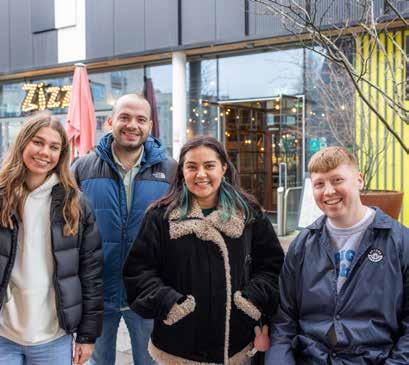
WHAT DO YOU LIKE ABOUT LIVING IN PLYMOUTH AND THE SURROUNDING AREA?
There’s been a significant amount of investment and development within the city, from infrastructure to commerce, tourism and leisure. There is a wide variety of food and drink places from chains to local businesses scattered all over Plymouth. If you love getting outdoors, Plymouth has plenty to offer from Dartmoor National Park, the Barbican, the Hoe, plenty of beaches locally and being so closely situated to Cornwall. The city is easy to get around, even if you don’t have a car.
HOW DID THE UNIVERSITY HELP YOU ADAPT TO THE DEMANDS OF A POSTGRADUATE PROGRAMME?
From mental health, financial, academic, pastoral, etc. I have been blown away by the additional services and resources that are available to me at the University. There are multiple different academic writing support options available, which was a real positive as I have never been the strongest academically. This really helped me to get back into the swing of things having had eight years out of education. Having a specific postgraduate induction week was helpful in getting me back up to speed with being a student again.
WHAT IS IT LIKE GETTING TO STUDY IN THE BRAND NEW INTERCITY PLACE BUILDING?
The facilities are tremendous. It’s such a luxury to be able to transition from theoretical teaching into a practical within the same room. Having these
specialist spaces for such a practically driven course and vocation was a big draw. Having a designated floor specifically for physiotherapy as well as a building – InterCity Place –specifically for our school (School of Health Professions) was fantastic and really made us feel valued.
WHAT ARE YOU HOPING TO ACHIEVE PROFESSIONALLY (OR ACADEMICALLY) ONCE YOU GRADUATE? HOW IS THE UNIVERSITY SUPPORTING YOU WITH THIS?
I am hoping to go straight into employment upon successfully graduating. There was recently an opportunity to attend a careers fair. Having access to both face-toface and online careers support is something that is always available, as well as the staff providing bespoke feedback to our cohort on applying for jobs and advice on our CVs.
FINALLY, ANY INSIDER TIPS FOR FUTURE STUDENTS?
I would say make sure you really read around the programme and make sure you know what you are getting into. You are often told by staff, you need to have the right expectations and not underestimate the challenges of the programme. Furthermore, make sure you familiarise yourself with the support available to you and make sure you use it when you need it! Lastly, come in with the right attitude that you are here to learn new skills, absorb knowledge, and build relationships with other aspiring healthcare professionals.

JOIN YOUR EXCLUSIVE COMMUNITY, A SPACE WHERE YOU CAN MEET OTHER APPLICANTS AND ASK OUR CURRENT POSTGRADUATE STUDENTS YOUR QUESTIONS.
/PlymUni